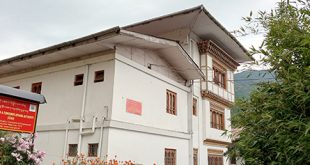Ugyen Dorji (20) from Punakha, a Digital Fabrication trainee at the Jigme Wangchuck Power Training Institute (JWPTI), will be representing the nation at the CezeriFEST 2025 International 3D Design & 3D Printing Competition in Turkey this month.
CezeriFEST is a global platform that brings young innovators together to showcase practical ideas using 3D design and printing.
It will take place in Turkey from 24th -28th November, and revolves around a theme focused on improving the lives of persons with disabilities through 3D design and 3D printing.
Ugyen’s project, “Pressing Mechanical Dishwasher for Easy and Portable Habits for Persons with Disabilities,” made it to the top 10 finalists.
Ugyen, in his conversation with The Bhutanese, spoke about the vision and motivation that shaped his project.
He explained that the competition itself was designed to encourage young innovators to address the everyday challenges faced by persons with disabilities.
“The inspiration for designing a mechanical dishwasher for individuals with physical disabilities came from observing the daily struggles many people face with routine household chores,” he said.
In Bhutan, dishwashing remains a fully manual chore in most homes, and Ugyen observed that the task becomes especially difficult for people with limited mobility, joint pain, or motor impairments. Actions that seem ordinary, standing at the sink for long periods, gripping slippery plates, or scrubbing heavy pots, can be exhausting or even painful for many individuals.
To understand these challenges more deeply, Ugyen said, “I engaged directly with individuals who experience these limitations in their daily lives.”
He added that speaking to caregivers, elderly community members, and persons with physical disabilities gave him clearer insight into the struggles they face.
“I learned how repetitive washing, cold water, and difficult sink heights create discomfort and dependence on others,” Ugyen said.
These interactions, he said, helped him pinpoint exactly where support was needed and shaped the functional aspects of his design. His aim was not just to build a device, but to create something that could ease daily hardship. He said his goal was to restore independence, reduce physical strain, and bring dignity back to routine tasks.
Ugyen shared that the idea was rooted in a simple observation that carried a powerful message. He said, “Many everyday tasks that seem effortless for most people can be extremely challenging for individuals with physical disabilities.” This experience pushed him to think about how design and engineering could be used to help restore their independence.
According to Ugyen Dorji, the design of his dishwasher focuses on ease of use, accessibility, and environmental friendliness. The device uses a spring-based pressing spinner system, allowing users to clean dishes with very little physical effort. Its compact and lightweight build makes it suitable for small kitchens, and because it operates without electricity, it can also be used in homes with limited resources or in places where power supply is unreliable.
When asked how long it took him to conceptualize, design, and develop the prototype, Ugyen said the project required a steady and committed effort over several months. He explained that each stage, from the initial idea to the working model, needed careful planning, research, and hands-on experimentation.
He said, “The conceptualization phase took around 2-3 weeks, during which I focused on understanding the real needs of persons with disabilities, gathering feedback from users, and sketching possible solutions.”
Once he had a clear direction, he moved on to the technical side of the work. The design and engineering stage took another one to two weeks, during which he developed detailed drawings, selected appropriate materials, refined the mechanism, and ensured that the structure would be both practical and safe for users.
The next stage, which involved building and testing the prototype, took an additional two to three weeks. He said, “During this time, I tried to build the working model, tested its performance, identified weaknesses, and made necessary improvements to increase efficiency and user-friendliness; however, it is not yet a completed model as it remains with some drawbacks and flaws which are needed to be modified in such a way that it could really help those with different disabilities.”
Despite the remaining improvements he hopes to make, Ugyen said the process has been invaluable, allowing him to understand both the technical possibilities and the real-world limitations faced by persons with disabilities.
Ugyen shared that his journey into digital fabrication began through the Gyalsung program, which collaborated with JWPTI to provide practical skills training for the first batch of youth. He was placed in the Digital Fabrication course, and it was during this training that he first developed an interest in designing assistive tools. A few months later, when he heard about the international competition, he decided to apply and eventually secured a spot among the top 10 finalists.
He said this opportunity would not have been possible without Gyalsung, and expressed deep appreciation for His Majesty The King.
He said, “I would like to express my deepest gratitude to His Majesty The King for the extraordinary vision and leadership that made the Gyalsung initiative a reality.”
Ugyen described Gyalsung as much more than a national service program, noting that it provides an important foundation for young Bhutanese to build confidence, purpose, and practical skills. He said the initiative gives youth the chance to explore their abilities and transform their potential into meaningful capability under His Majesty’s guidance.
According to him, the training, discipline, and knowledge offered through Gyalsung not only prepare participants to be responsible citizens but also shape their character, resilience, and sense of unity.
He said, “This opportunity has opened doors for us to gain practical skills, understand national values more deeply, and contribute proactively to Bhutan’s future.”
He added, “On behalf of all participants, I humbly offer my heartfelt appreciation to His Majesty for giving us this remarkable national service. We pledge to honor this opportunity, uphold our duties with integrity, and strive to serve the nation in ways that reflect His Majesty’s noble aspirations.”
Ugyen also had a message for young people like him. He said that many youths lose confidence when faced with challenges, but opportunities such as Gyalsung and technical training programs can open new pathways if they are willing to take the first step.
He encouraged his peers to stay motivated, explore their interests, and build skills that will help them grow both personally and professionally.
 The Bhutanese Leading the way.
The Bhutanese Leading the way.




